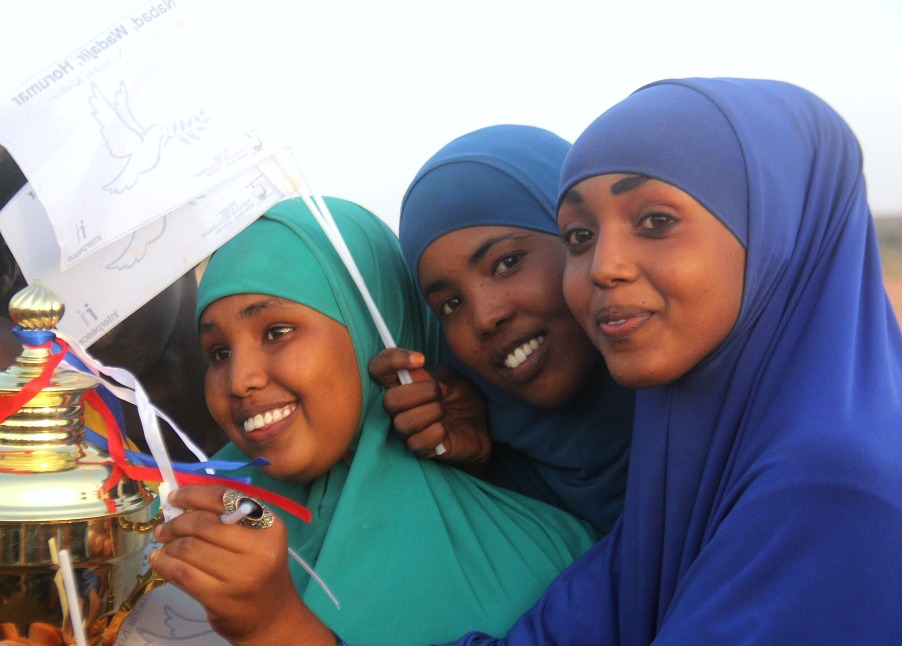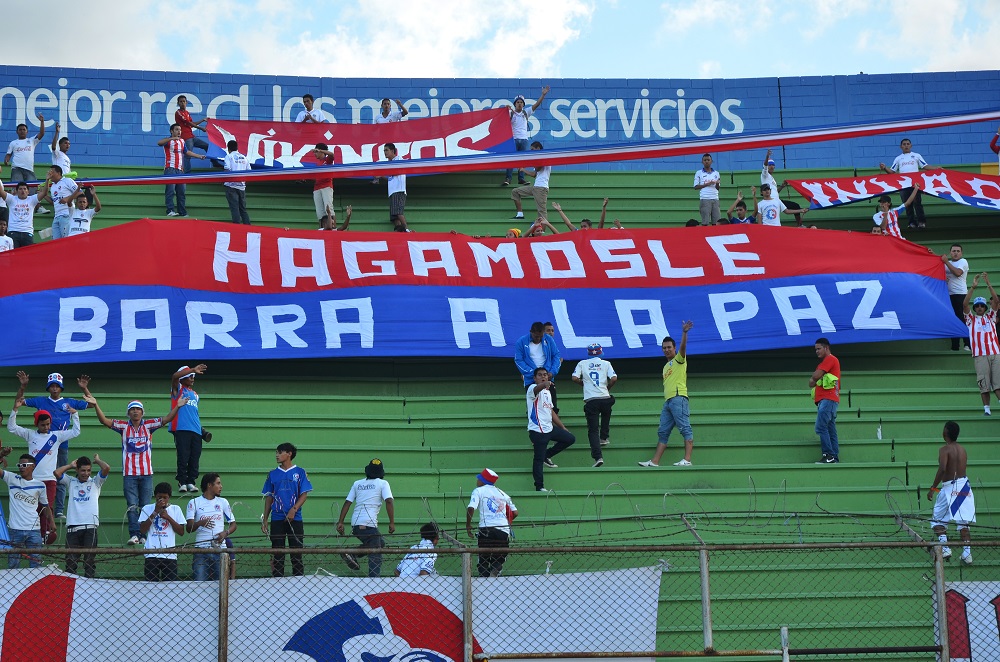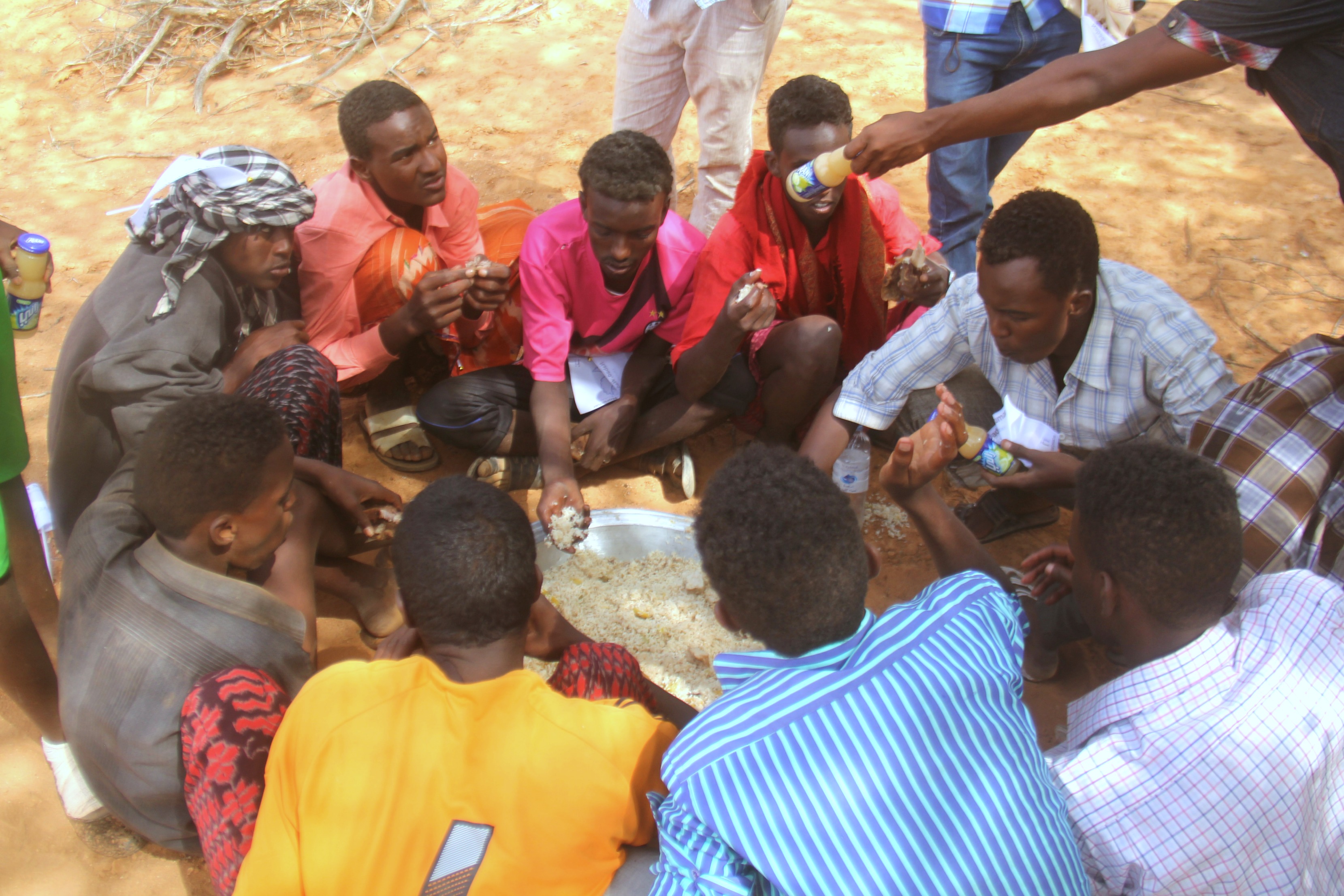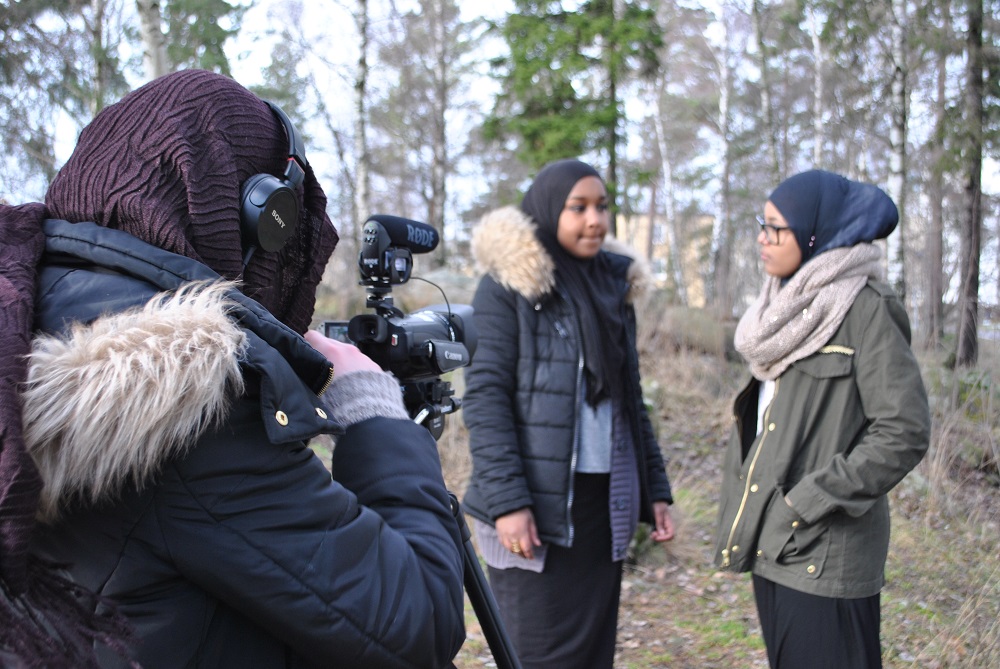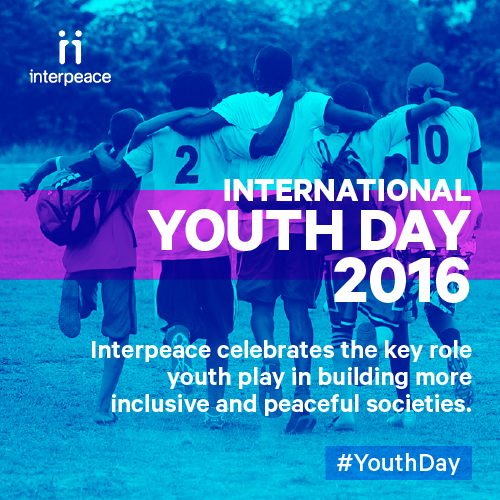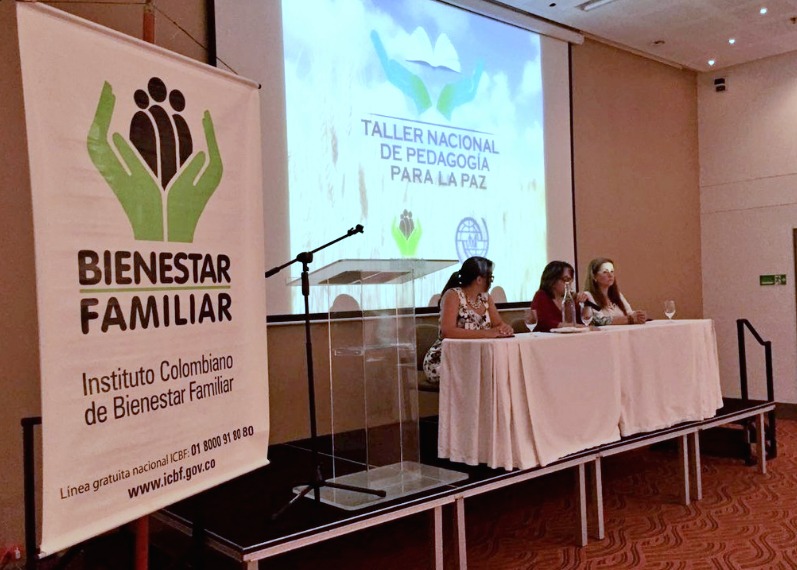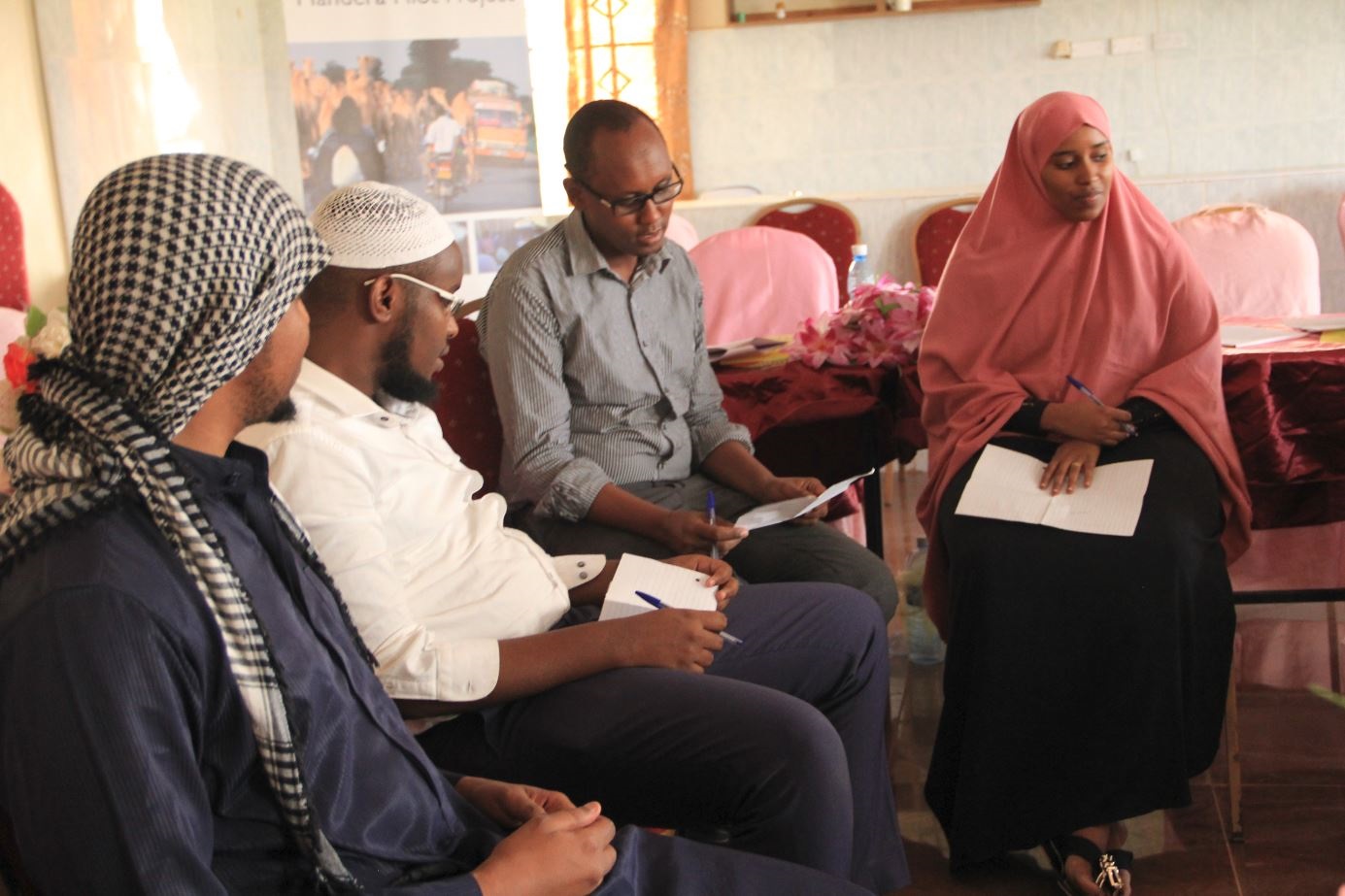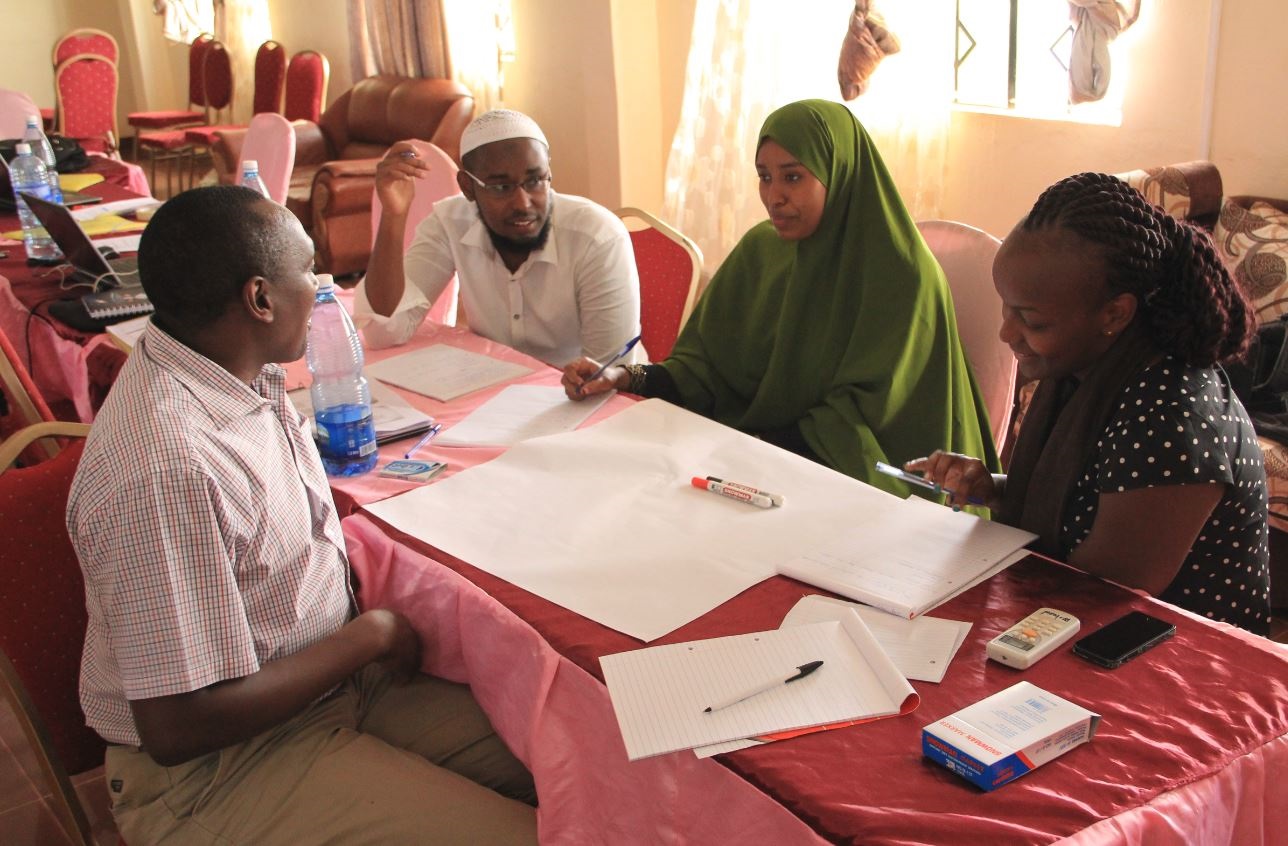The districts of Nueva Concepción and Ilopango share two particular characteristics. Both towns are located in the midst of breathtaking water landscapes: the Lempa River and the Ilopango Lake. And although they are surrounded by peaceful scenarios, both Nueva Concepción and Ilopango, are located in one of the countries with the highest homicide rates in the world: El Salvador.
In 2015, homicide rates in El Salvador reached a historic high for the post-war period, of 116 murders per 100,000 inhabitants. In this context, Interpeace’s programme is working to strengthen the capacities of people involved and affected by this conflict, in order for them to define the problem, and gain a sense of responsibility and ownership of the solutions that can generate peaceful transformations in their communities. Interpeace firmly believes that this objective can only be reached through the inclusion of all social groups, not only governments and political elites, but also through the participation of civil society.
Interpeace’s programme, entitled “Comprehensive initiatives to prevent violence in El Salvador,” developed with the support of the European Union, is being implemented in ten districts throughout the country. The project seeks to work with at-risk youth between the ages of 18 and 29, with the objective to build capacities for entrepreneurial activities. This programme entails three specific steps: the first is to provide young adults with the necessary tools and methods to peacefully transform conflict. The second step, consists on training these young adults in the field of entrepreneurship. And lastly, the third step involves overseeing the establishment of productive associations and providing seed capital, specifically for materials and equipment to enable the implementation of their entrepreneurial ideas.
The programme is already underway and throughout July 2016, two workshops were developed focusing on the second step of the project. On July 14, 19 young adults from the district of Ilopango participated in a training session where they identified the enterprises they would like to implement in their community. The next day on July 15, a similar workshop took place in the district of Nueva Concepción. In both towns, the risks and opportunities of each enterprise were discussed and participants engaged in recollecting information to better define the implementation of each project. It’s important to highlight that these participants will ultimately choose the enterprise they want to initiate, as a way to consolidate the local ownership of the process. During August 2016, similar workshops will take place in the other 8 districts established by the programme. At the end of this phase, these young adults will participate in training sessions, aimed at implementing their enterprises.
Offering productive opportunities to youth is a key strategy to preventing violence. Empowering youth through these processes, helps decrease their involvement in threating activities and turns them into agents of positive change within their communities.
Youth are one of the main victims of exclusion around the world, both in fragile and developed contexts. Ethnic diversity, as well as religious, economic, social and political differences, create multiple barriers within societies, which most often fail to respond to the needs of young people. In this absence of opportunities and participation, youth become vulnerable and many times stay caught in a vicious cycle of violence and stigmatization. But as UN Secretary-General Ban Ki-moon said, “Youth are more than victims of poverty and economic downturn – they can be agents of change.”
Interpeace recognizes that marginalization and disengagement can lead to devastating effects in the lives of young adults. But if they are given the opportunity, youth have an invaluable role in the contribution of building more inclusive and peaceful societies. For this reason, in the past 22 years, Interpeace has engaged youth in a wide range of peacebuilding initiatives, where they have become powerful leaders of positive transformations in their communities.
In Latin America Interpeace has worked with youth since 2007: leading participatory processes to develop comprehensive public policy proposals, which addressed root causes of youth-related violence in seven countries in Central America, and supported the creation of regional youth networks by providing trainings to improve their peacebuilding capacities. More recently, in Honduras and El Salvador, two of the countries with the highest homicide rates in the world, Interpeace has worked with sports clubs in Tegucigalpa to build trust and find common ground between rival groups, as well as promote entrepreneurial capacities with youth groups in El Salvador.
Working with youth has also been at the heart of many programmes developed in West Africa. In Abidjan, Interpeace and its partner organization Indigo Côte d’Ivoire work specifically with youth engaged in organized crime. Through a process of interactive dialogue, the project seeks to reconnect at risk youth with their respective communities. And in Mali, with its partner organization the Malian Institute of Action Research for Peace (IMRAP), programmes have focused on providing spaces for dialogue to promote trust and social cohesion by encouraging cultural exchange between young Malians.
In Eastern and Central Africa, Interpeace has also worked with multiple partner organizations to nurture youth as peacebuilders. Supported by its partner organization in Puntland, the Puntland Development Research Center (PDRC), youth were able to lead the way to peace in a feud between two clans in the Rako district helped by PDRC’s Mobile Audio-Visual Unit (MAVU). Youth activists were able to take action together, which led to the signing of peace agreements in 2015, which ended a five-year conflict. Moreover, working with The Economic Community of the Great Lakes countries (CEPGL), which brings people together from Burundi, the Democratic Republic of Congo and Rwanda, Interpeace has worked in diverse peacebuilding activities designed to foster critical thinking, deconstruct stereotypes, raise awareness about identity manipulation, and foster relationships among young adults from different backgrounds.
In developed nations like Sweden, exclusion is also a serious problem amongst the youth. In 2014, Interpeace developed a participatory research project to analyze the main issues facing the area of Tensta, a neighborhood that is home to a large immigrant population, which suffered a series of social unrests and protests in 2012 and 2013. Exclusion and marginalization were two of the main factors highlighted by the people interviewed, especially with regards to youth and how they are affected by a lack of participation in their community’s development and employment opportunities. Research also revealed that the Tensta youth can play a central role for positive change in the area. As a result, Interpeace is now working with youth on solutions to build more inclusive societies. A video was made by the young activists of Tensta telling their stories in a Documentary called “Dreams from Tensta.”
Breaking barriers, reinforcing trust and understanding the dynamics of youth groups around the world are fundamental strategies in peacebuilding efforts. Providing opportunities and spaces for active participation will help youth become the leaders of the future, and will enable them to recognize themselves as powerful agents of positive change. For this reason, Interpeace celebrates Youth Day - young adults, unquestionably, play a key role in building more inclusive and peaceful societies.
On July 5th 2016, the Heinrich Böll Foundation invited Ana Glenda Tager, Interpeace’s Regional Director for Latin America, and José Luis Sanz, Director of the Salvadoran newspaper El Faro, to participate in a public debate entitled: “Violence and Insecurity in Central America: The Failure of the Hard-Fisted Policies and the Debate on Alternative Democratic Concepts.” Bernd Pickert, journalist of the German Newspaper Die Tageszeitung, moderated the debate, which took place in Berlin.
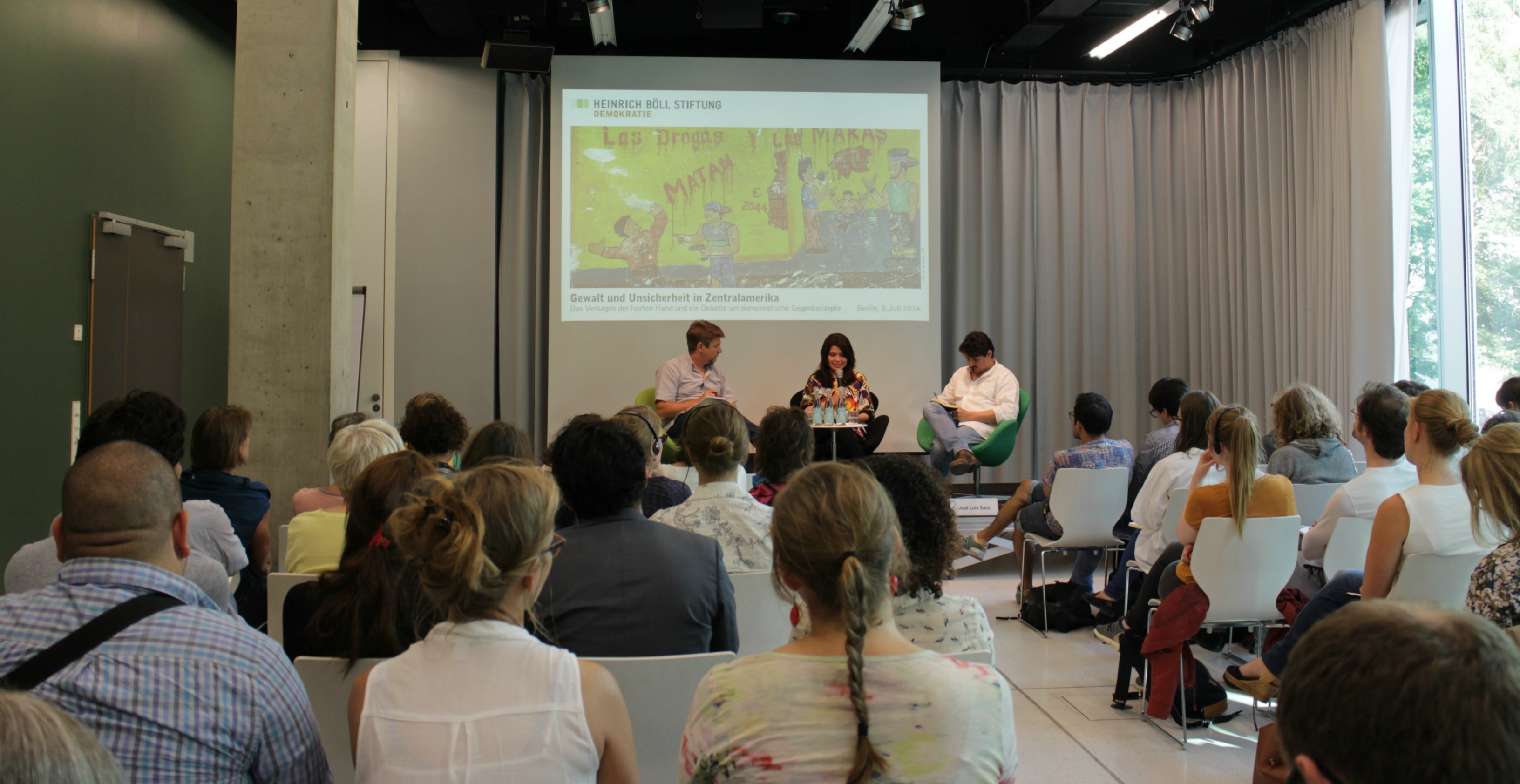
Ana Glenda Tager, Interpeace’s Regional Director for Latin America; José Luis Sanz, Director of the Salvadoran newspaper El Faro; and Bernd Pickert, journalist of the German Newspaper Die Tageszeitung.
A third of the world’s overall homicides occur in Latin America. The Northern Triangle of Central America, conformed by Guatemala, Honduras and El Salvador, have the highest murder rates in the world. The homicide rate in El Salvador in 2015, was of 116 for every 100,000 people. And in Guatemala and Honduras, the homicide rate was 60 for every 100,000. In contrast, the world’s average homicide rate is 6.2 for every 100,000 citizens.
According to the Organization of American States, victims are mostly men between the ages of 20 and 30. However, the number of femicides and homicides of members of the LGBT community are increasing.
These issues have led to a series of unfortunate consequences within society. They have generated mistrust, broken social cohesion and have imposed a social order, were violent reactions are encouraged in a vicious cycle. At the same time, they have raised social tolerance to violence, illegal forms of economy and the loss of thousands of lives.
So far the problem has been tackled through repressive means, using the so-called Mano Dura or Hard-Fisted policies. The State’s indifference to solve these social issues has led to an excessive involvement of the Army in public security. Interpeace’s experience shows that a preventive approach to these issues is necessary to transform violent dynamics, from a peacebuilding perspective. However, this preventive focus must be placed on all the actors involved in violence and not only on young vulnerable adults, as it is usually done.
At the same time a tertiary prevention is also pivotal, which would focus on the work done with prisoners, given the direct relation between the detention centers and criminal dynamics.
Through dialogue, Interpeace seeks to strengthen the bonds of trust, shorten the distance between all actors of society, including the most marginalized and stigmatized and therefore stimulate the development of non-violent and collaborative solutions to the challenges faced by society.
Parallel events to the Public Debate
As part of Ana Glenda Tager’s visit to Berlin, she participated in a series of meetings organized by the Heinrich Böll Foundation:
- A debate with journalists and activists from Berlin that work in NGOs based in Central America: Amnesty International, Misereor, Brot für die Welt, INKOTA (INformation, KOordination, TAgungen), Berghof Foundation and the German Institute for Human Rights.
- An open exchange of ideas about violence and insecurity in Central America with important representatives of the German Parliament and Government: Tom Koenigs and Hans-Christian Ströbele, Congressmen of the Green Party in Parliament, Wolfgang Hoelscher-Obermaier, Deputy Head of Division for Latin America at the German Foreign Office, and Ulrike Metzger, Deputy Head of Regional Development for Central America of the Federal Ministry for Economic Cooperation and Development.
- A visit to the House of the Wannsee Conference: Memorial and Educational Site, guided by the Director of Education, Elke Gryglewski. The visit to this iconic place illustrates the importance of historic memory in peacebuilding processes and it serves to remind us that peacebuilding efforts are fundamental in our contemporary world.
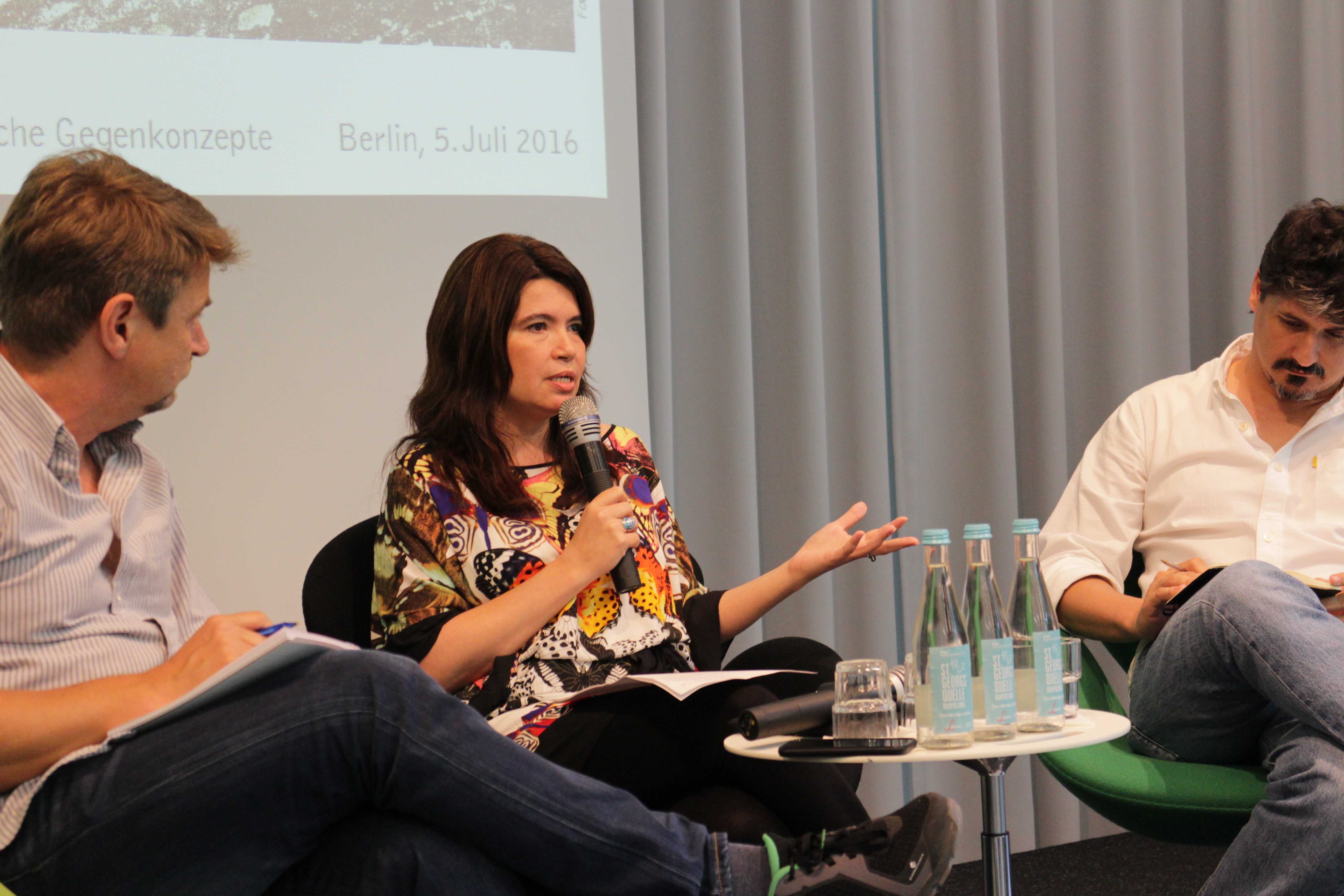
Ana Glenda Tager, Interpeace’s Regional Director for Latin America in Debate held in Berlin. Photo credit: Interpeace
From June 27 - 28, Interpeace participated in an event organized by the Colombian Family Welfare Institute (ICBF) in Cartagena. The event gathered several Family Defenders and their teams from different regions of the country, to prepare them for the diverse challenges of the peacebuilding process and to ensure children’s and teenager’s rights in those regions of the country that have been prioritized for the post-conflict.
The activity focused on updating these Family Defenders on the challenges they will face during the implementation process, by strengthening their capacities with instructive knowledge and useful methodologies that can be used in the most affected areas, where the demobilization of minors from guerrilla ranks will occur. For this activity the ICBF asked Interpeace to make two interventions, which were presented by Enrique Sánchez Airas, Head of Programme Development for Interpeace’s Regional Office in Latin America. His presentations were about the lessons learned of the post-conflict process in Central America, as well as a resilience approach for peacebuilding and how this can contribute to the work done by Family Defenders with at risk children and teenagers.
Amongst the topics mentioned during the first day of the event, Enrique Sánchez commented on the violence transformation processes in the different stages of the post-conflict in Central America and how these affected the youth in particular. He discussed the effects of the different public policies implemented in the countries of Central America and described how the gang’s phenomena evolved in the Northern Triangle. Moreover, Sánchez spoke about the lack of attention to minors in the demobilization processes and the differences with the Colombian context. After his presentation there was an open exchange of ideas about the implications of these lessons to the process of demobilization, which will occur in a few months in Colombia.
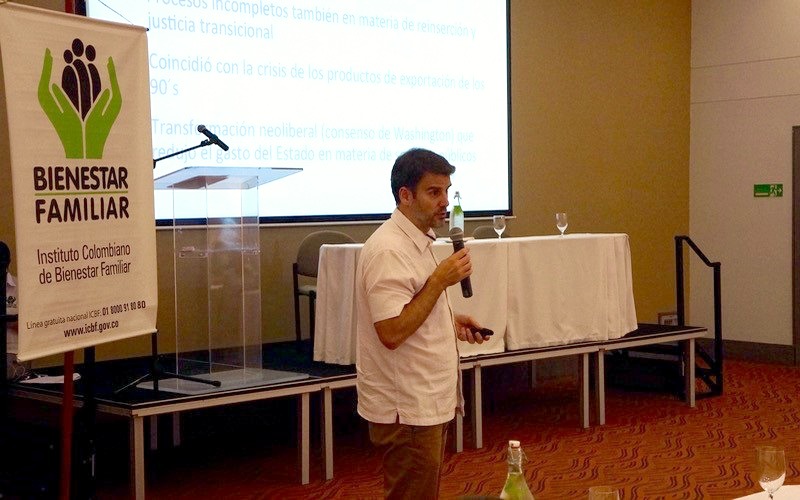
Enrique Sánchez Airas, Head of Programme Development for Interpeace’s Regional Office in Latin America. Photo credit: Interpeace
Interpeace also participated in the final panel of this event, a debate with Gloria Camilo of War Child and Paula Ila of the National Centre of Historic Memory. In his intervention about the resilience approach in peacebuilding, Enrique explained the origins of the concept of resilience and the particularities concerning peacebuilding, including the identification of some types of negative resilience, which is an aspect that is not present in the description of resilience by other disciplines. There was also an emphasis on the different levels of the concept’s application: individual, community, State and social. Lastly, there were three types of resilient capacities identified: absorption, adaptation and transformation, emphasizing that the most relevant, from the peacebuilding perspective, is the capacity of an individual or a social group to positively transform their reality. All the contributions on this subject were framed under the Frameworks for Assessing Resilience project that Interpeace implemented in Guatemala, Liberia and Timor Leste for the past two years.
Hassan Ismail likes to joke that the trajectory of his life has been defined by conflict. Born and raised in Kenya’s Mandera County, Hassan has experienced violent clan conflict several times in his life. On two occasions when he was a child, his family was ransacked in violent episodes of conflict, losing their entire herd of camels and with it their livelihood. The second attack that took place when Hassan was a teenager proved the most devastating. Hassan’s father, known in his prime as a hardworking family man, was unable to set the family back on its feet due to the frailties of age. Life became a difficult struggle. But through sheer determination, Hassan was able to struggle his way through school and to embark on a life of service to the community. He has worked as a school teacher, a humanitarian aid worker and now coordinates Interpeace’s new peacebuilding programme in Mandera.
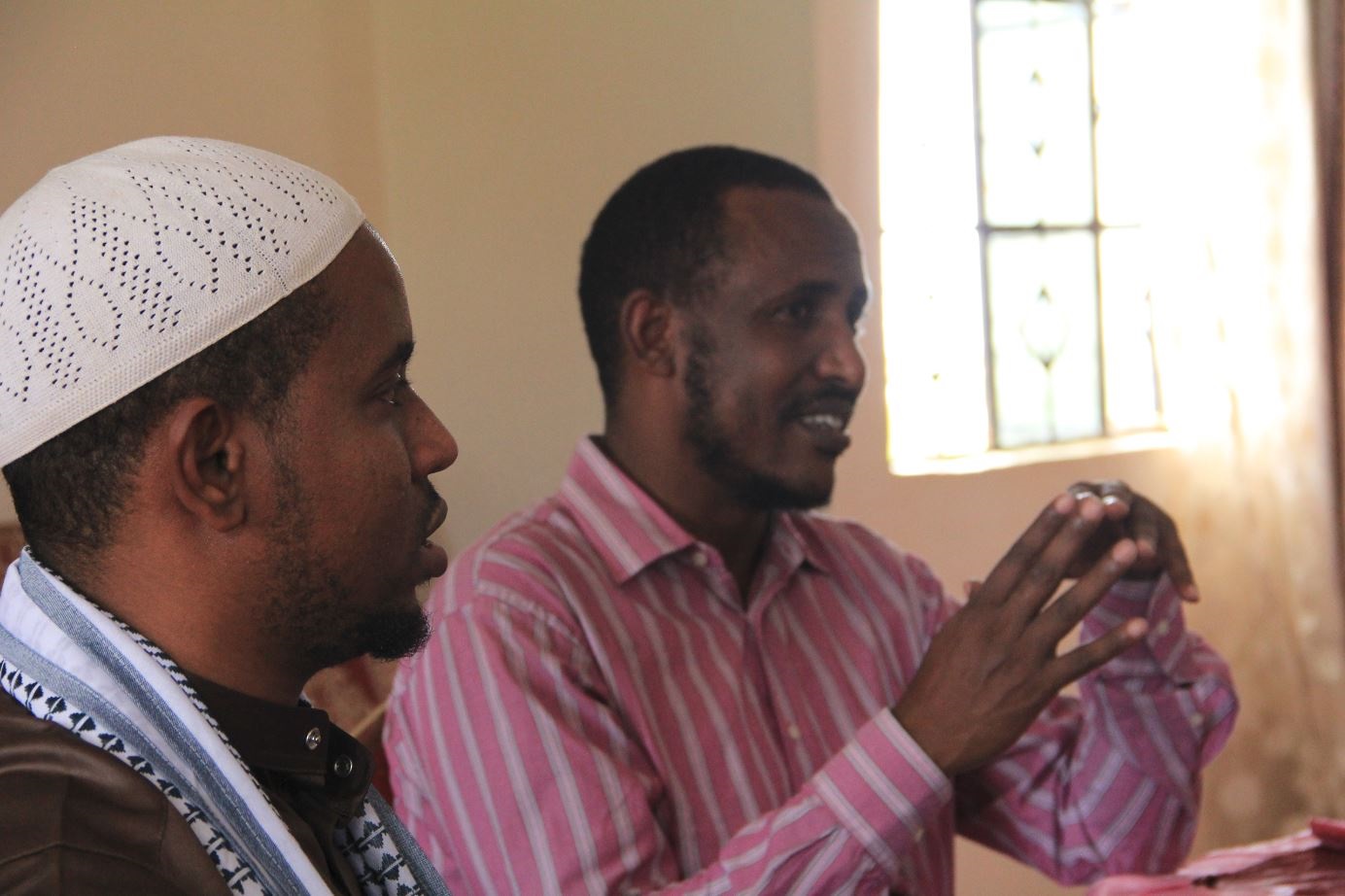
Hassan (right) makes a point during the induction of the Mandera programme team. Photo credit: Interpeace
Hassan is quick to clarify that his experience is not unique. His story rings true for many people from Mandera County, which has had a long history of clan conflict and marginalization. While many of the conflicts were traditionally rooted in territorial disputes, they have in recent decades been compounded by competition over political and economic opportunities. A new national constitution adopted in 2010 ushered in Kenya’s Second Republic, and with it a new era of devolved governance. The advent of devolution was welcomed by many residents of Mandera, who were optimistic that their historical marginalization might finally come to an end. But while devolution brought national resources, social services and governance closer to the local population, also provided a new frontier for contention between the County’s various clans for political and economic power.
It is in the midst of these challenges that Interpeace’s Mandera peacebuilding programme seeks to provide a glimmer of hope. Implemented in partnership with Kenya’s National Cohesion and Integration Commission (NCIC), the programme’s goal is to integrate grassroots aspirations for peace, building on local capacities and providing a strategic link with decision and policy makers at the national level. The programme marks a departure from past peace initiatives, which were largely top-down interventions mobilized to contain situations that had already escalated into violence.
“Many peace efforts were unstainable because local voices were missing from the equation,” Hassan explains.
Taking a bottom-up approach, the Mandera programme seeks to progressively build peace by placing local populations in the driving seat, particularly in the identification of both the impediments to peace and possible solutions. The NCIC completes the picture by providing the crucial channel through which the government will better understand the underlying causes of these clan conflicts.
One of the ways in which local voices will be captured is through the Mobile Audio Visual Unit (MAVU). Interpeace has decades of experience using audio-visual means, mainly mobile cinema, to build trust and understanding among communities divided by either conflict or geographical distance. The MAVU approach involves facilitated dialogues catalyzed through documentary films, which are additionally used to bring the voices of local populations to the attention of policy and decision makers.
“The opportunity for the government to perceive the conflicts from the perspective of grassroots people will make a great difference,” Hassan says. “It will pave the way for the development of long-term structures for peace, built and endorsed by people at the grassroots level.”
Read more about Interpeace’s work in Eastern and Central Africa.
Veuillez trouver ci-dessous la version française
On June 30, 2016, the Institut Malien de Recherche Action pour la Paix (IMRAP) in partnership with Interpeace, launched two reports and documentary films entitled “Evolution of Societal Values and building trust between civilians and Defense and security forces: Diagnosis and solutions for sustainable peace in Mali”. These contain the results of the participatory action research process, which consulted over 2,000 Malians across the regions of the country, as well as neighboring refugee camps.
This participatory action-research was the second step of a process to enhance trust and consolidate peace in Mali. It established a consensus and shared vision on what the solutions to two of the previously identified obstacles to peace in Mali are. Convinced that the only way to build sustainable peace is through processes that allow for inclusion, constructive dialogue and consensus building, these solutions are therefore a basis on which the Malian society can collectively build upon to effectively address its challenges to peace.
During the official presentation of the reports and films, a member of the Steering Committee who participated in the process said, “Malians had the courage to speak of their problems and of solutions. Government Officers agreed in listening to them. Right now we are in the phase of implementation and everyone must get involved.”
The full reports can be found here:
- Renforcement de la Confiance entre les Populations Civiles et les Forces de Défense et de Sécurité
- Mutations des Valeurs Sociétales: Diagnostic et Solutions pour une Paix Durable au Mali
The executive summary for both reports is also accessible here:
The documentary films (French) are available in the following links:
Rapport sur « Mutation des Valeurs Sociétales, Renforcement de la confiance entre populations civiles et forces de défense et de sécurité : Diagnostics et solutions pour une paix durable au Mali ».
Le 30 juin, 2016, l’Institut Malien de Recherche Action pour la Paix (IMRAP), en partenariat avec Interpeace, a publié deux rapports et films documentaires intitulés « Mutation des Valeurs Sociétales, Renforcement de la confiance entre populations civiles et forces de défense et de sécurité: Diagnostic et Solutions pour une paix durable au Mali. » Les rapports et le film regroupent les résultats d’un processus de recherche- action participative conduite auprès de 2,000 Maliens de l’ensemble des régions du Mali et de camps de réfugiés de pays voisins.
Cette recherche-action participative est le second jalon d’un processus de renforcement de la confiance et, plus largement, de consolidation de la paix. Il a établi de manière consensuelle une vision partagée sur les solutions à apporter aux obstacles à la paix au Mali, identifiés au préalable par les Maliens. L’unique moyen de construire une paix durable est par la mise en place de processus permettant l’inclusion, l’établissement de dialogues constructifs et la recherche de consensus. Sur la base de cette compréhension commune, la société malienne peut désormais entamer collectivement la mise en œuvre des solutions durables à ces défis.
Au cours de la présentation officielle des rapports et des films, un membre du Comité de Pilotage pour les valeurs thématiques qui a participé au processus a dit, «Les Maliens ont eu le courage de parler de leurs problèmes et des solutions. Les gouvernants on aussi accepté de les écouter […]. Maintenant nous sommes dans la phase de mise en pratique et il faut que chacun s’engage.»
L’intégralité des deux rapports est disponible ici:
- Renforcement de la Confiance entre les Populations Civiles et les Forces de Défense et de Sécurité
- Mutations des Valeurs Societales: Diagnostic et Solutions pour une Paix Durable au Mali
Un résumé du rapport est également disponible ici:
Les films documentaires peuvent être visionnés en suivant les liens suivants:

